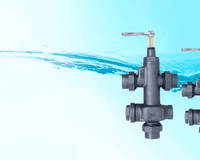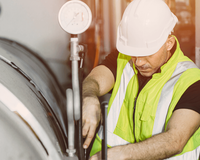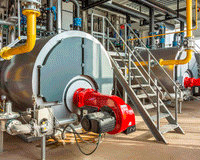In many processes that occur within the industry, having energy generated by boilers is an essential factor. Precisely for this reason, prioritizing boiler maintenance is of great importance.
If the industry does not invest in periodic maintenance of its boilers, it may suffer major losses. In more serious cases, these losses can put the operation of the business and even the safety of operators at risk.
Therefore, recognizing the importance of boiler maintenance is a key factor in avoiding greater losses.
Check out this content to find out why your industry should invest in periodic maintenance of its boilers and what tips there are to make this procedure as effective as possible.
Why promote periodic boiler maintenance
Ensuring more efficient boiler maintenance is of utmost importance within any industry and should be on the list of priorities of any industry manager or entrepreneur.
There are several reasons that reinforce the importance of maintaining this equipment. The first of these reasons for maintenance is to ensure the operational safety of the industry.
Boilers are equipment that always work under high pressure, and consequently they have several safety devices that ensure the proper functioning of the equipment. Maintenance and preventive inspections are responsible for ensuring the correct functioning of these devices.
Regular maintenance also ensures that boilers operate continuously. If this does not occur, the boiler may experience unexpected shutdowns, and consequently an entire sector may come to a standstill, compromising the day-to-day activities and income generation of the industry.
Still in the economic sphere, the investment in good boilers is usually quite high, so prioritizing boiler maintenance means protecting the investment, ensuring that the boiler can operate for the entire useful life suggested by the manufacturer.
Obligations provided for by law
The best way to ensure that the basic principles of good boiler maintenance are adopted is to follow regulatory standard NR13.
This regulatory standard is responsible for establishing all the requirements that must be met by companies that use steam boilers, as well as pressure vessels and interconnection pipes for these systems.
In NR13, the “maintenance” factor is the main point that aims to guarantee the safety and health of workers. The standard highlights that it is the company's duty to ensure all possible measures responsible for eliminating, reducing or controlling possible serious or imminent risks.
It is also the company's responsibility to present all documentation that attests to due compliance with the NRs to the Ministry of Labor whenever requested. This documentation also includes all maintenance controls already performed.
The organization is also obliged to ensure that proper testing and repairs of boilers are carried out under fully safe conditions. This helps to avoid any harm to the physical integrity of the professionals involved.
In addition to the maintenance of the boilers themselves, NR13 highlights that monitoring, assessments and possible repairs must also be carried out on equipment that assists their operation, such as pumps, filters, motors, generators, among others.
Recommendations to ensure good boiler maintenance
Ensuring efficient boiler maintenance must comply with what is required by NR13. The first step is to draw up a maintenance plan with all the details to be adopted.
This plan describes all maintenance frequency, defines the instruments to be adopted and control systems. It must also present the assignment of professionals with legal competence to perform this type of activity.
These professionals must also receive specific training regarding the application of maintenance provided for in NR13, as well as always taking periodic refresher courses.
In addition, technicians assigned to boiler maintenance need to perform several tasks, described as mandatory in NR13, which are:
- Inspection of furnace weld intersections;
- Visual examination of the boiler's front and rear mirrors;
- Cleaning of the electrodes of both the level bottle and the boiler body;
- Checking all electrical wiring;
- Verification of the entire water supply system;
- Checking the steam output;
- Calibration and maintenance of safety devices, such as: safety valve, pressure gauges, pressure switches, level controllers, chimney gas temperature indicators;
- Maintenance on the electrical panel;
- Analysis of the conservation status of the boiler water piping, in addition to analysis of water treatment with a competent professional;
- Carrying out tests on emergency systems.
These activities must be carried out periodically and must be performed in accordance with the provisions of the boiler maintenance plan. These factors will ensure the integrity of the equipment and workers and the constant operation of the industry.
To learn more about boilers and devices associated with them,keep following the MBX blog .




